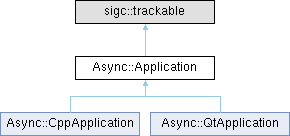The base class for asynchronous applications. More...
#include <AsyncApplication.h>

Public Member Functions | |
| Application (void) | |
| Default constructor. | |
| virtual | ~Application (void) |
| Destructor. | |
| virtual void | exec (void)=0 |
| Execute the application main loop. | |
| virtual void | quit (void)=0 |
| Exit the application main loop. | |
| void | runTask (sigc::slot< void > task) |
| Run a task from the Async main loop. | |
Static Public Member Functions | |
| static Application & | app (void) |
| Get the one and only application instance. | |
Protected Member Functions | |
| void | clearTasks (void) |
Friends | |
| class | FdWatch |
| class | Timer |
| class | DnsLookup |
Detailed Description
The base class for asynchronous applications.
This is the base class for all asynchronous applications. It is an abstract class and so it must be inherited from to create a class that can be instantiated.
Definition at line 119 of file AsyncApplication.h.
Constructor & Destructor Documentation
◆ Application()
| Async::Application::Application | ( | void | ) |
Default constructor.
◆ ~Application()
|
virtual |
Destructor.
Member Function Documentation
◆ app()
|
static |
Get the one and only application instance.
Use this static member function to get the one and only instance of the application object. If an application object has not been previously created, the application will crash with a failed assertion.
- Returns
- Returns a reference to the applicaton instance
- Examples
- AsyncAudioContainer_demo.cpp.
Referenced by Async::TaskRunner::cancel(), Async::TaskRunner::operator()(), Async::TaskRunner::operator()(), and Async::AudioThreadSource::~AudioThreadSource().
◆ clearTasks()
|
protected |
◆ exec()
|
pure virtual |
Execute the application main loop.
When this member function is called the application core will enter the core main loop. It will not exit from this loop until the Async::Application::quit method is called.
Implemented in Async::CppApplication, and Async::QtApplication.
◆ quit()
|
pure virtual |
Exit the application main loop.
This function should be called to exit the application core main loop.
Implemented in Async::CppApplication.
- Examples
- AsyncAudioContainer_demo.cpp.
◆ runTask()
| void Async::Application::runTask | ( | sigc::slot< void > | task | ) |
Run a task from the Async main loop.
- Parameters
-
task The task (SigC++ slot) to run
This function can be used to delay a function call until the call chain have returned to the Async main loop. This may be required in some cases where one otherwise would get into trouble with complex callback chains causing strange errors.
Use it something like this to call a function taking no arguments:
runTask(mem_fun(*this, &MyClass::func));
If the function need arguments passed to it, they must be bound to the slot using the sigc::bind function:
runTask(sigc::bind(mem_fun(*this, &MyClass::func), true, my_int));
In this case the function take two arguments where the first is a bool and the second is an integer.
Referenced by Async::TaskRunner::operator()(), and Async::TaskRunner::operator()().
Friends And Related Symbol Documentation
◆ DnsLookup
|
friend |
Definition at line 187 of file AsyncApplication.h.
◆ FdWatch
|
friend |
Definition at line 185 of file AsyncApplication.h.
◆ Timer
|
friend |
Definition at line 186 of file AsyncApplication.h.
The documentation for this class was generated from the following file:
Generated on Sun May 4 2025 14:24:10 for Async by